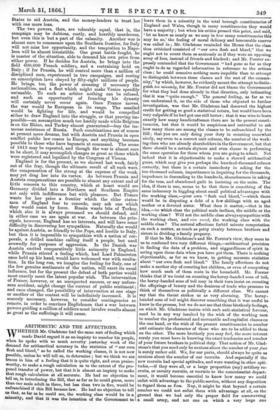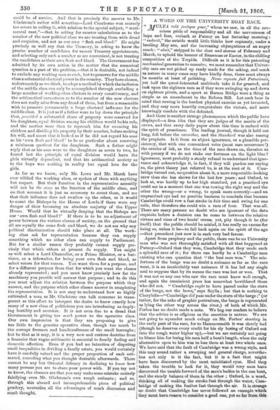ARITHMETIC AND THE AFFECTIONS.
WHETHER Mr. Gladstone had the same sort of feeling which made David regard it as an impiety to number his people, when he spoke with so much severity yesterday week of the demand for arithmetical accuracy in the statistics of " our own flesh and blood," as he called the working classes, it is not now possible, unless he will tell us, to determine ; but we think we see traces in him of a feeling that it is quite right, and even praise- worthy, to make a rough calculation as to the extent of the pro- posed transfer of power, but that it is almost an impiety to make that rough calculation at all accurate. He had no objection to tell us, in introducing the Bill, that as far as he could guess, more than one male adult in three, but less than two in five, would be enfranchised if this Bill became law. He had no objection to tell us that, as far as be could see, the working class would be in a minority, and that it was the intention of the Government to
leave them in a minority in the total borough constituencies of England and Wales, though in many constituencies they would
have a majority ; but when his critics pressed this point, and said, ' let us know as nearly as we may in how many constituencies this may be so,' the feeling of moral delicacy and honourable reserve was called in ; Mr. Gladstone reminded the House that the class
thus criticized consisted of " our own flesh and blood," that we ought not to count them as anxiously as if they were an opposing army of foes, instead of friends and kindred; and Mr. Forster ex- pressly contended that the Government " had gone as far as they ought to do as regarded information in reference to the artizan class ; he could conceive nothing more impolitic than to attempt to distinguish between these classes and the rest of the commu- nity," by which, however, he evidently meant the attempt to distin-
guish too minutely, for Mr. Forster did not blame the Government for what they had done already in that direction, only intimating. that it was "quite enough." The general feeling, as far as we can understand it, on the side of those who objected to further investigation, was that Mr. Gladstone had deserved the highest.
credit for getting so good a statistical return, but would have been very culpable if he had got one still better ; that it was wise to learn
exactly how many handicraftsmen there are in the present consti- tuencies, but that it would be suspicious and untrustful to ask how many there are among the classes to be enfranchised by the Bill ; that you are. only doing your duty in counting somewhat nicely, say even to a correct unit column, the number of the work- ing class who are already shareholders in the Government, but that there should be a certain shyness and even shame in performing the same operation for those whom you are going to admit. Not indeed that it is objectionable to make a shrewd arithmetical guess, which may give you perhaps the hundred-thousand column correctly, but there is a certain immodesty in asking for the ten-thousand column, impertinence in inquiring for the thousands, impudence in descending to the hundreds, shamelessness in asking for the tens, and abandoned guilt in insisting on the units. The idea, if there is one, seems to be that there is something of the- same indecency in higgling about small political advantages with the working class,—your own " flesh and blood,"—which there. would be in disputing a debt of a few shillings with an aged. mother or a devoted sister. What does it matter,—that is the idea,—to which class the political scale inclines, the middle or the
working class ? Will not the middle class always sympathize with the working class, and vice versa, the working class with the
middle class? The natural affections forbid minute computation on such a matter, as much as petty rivalry between brothers and sisters in dividing a family property.
If that be Mr. Gladstone's and Mr. Forster's view, they seem to us to confound two very different things,—arithmetical precision in finding the data of a problem, and niggardliness of spirit in acting upon those data when you have got them. There is nothing objectionable, as far as we know, in getting accurate statistics about "our own flesh and blood." The family affections do not make a mother shy of counting her children, or even of computing how much each of them costs in the household. Mr. Forster thinks that if we insist on counting the horny-handed sons of toil, the horny-handed sons of toil may in their turn insist on counting the offsprings of luxury and the denizens of trade who presume to think of themselves as politically a different class. We cannot say that the threat strikes us as very alarming. The horny- handed sons of toil might discover something that it was useful to know in the process, but we do not see that these biotherly feelings, on which Mr. Gladstone insists with such anti-statistical fervour, need be in any way insulted by the wish of the working men to number the professional and mercantile and capitalist classes on the one hand, or the wish of the present constituencies to number and estimate the character of those who are to be added to them on the other. The more brotherly you may feel, the more interest surely you must have in knowing the exact tendencies and number of your future brothers in political duty. That notion of Mr. Glad-
stone's that you need only be anxious about the number of your foes
is surely rather odd. We, for our parts, should always be quite as anxious about the number of our recruits. And especially if the new recruits had special aptitudes, and were wanting in other apti- tudes,—if they were all, or a large proportion (say) artillery re- cruits, or cavalry recruits, or recruits to the commissariat depart- ment, it would become essential to know how many we could enlist with advantage to the public service, without any disposition to fegard them as foes. Nay, it might be that beyond a certain number we could not enlist them with advantage at all, on the ground that we had only the proper field for mancsuvring a small army, and not one on which a very large one could be of service. And that is precisely the answer to Mr. Gladstone's rather wild assertion—Lord Cranborne was scarcely too severe in calling it, with relation to the special subject, " senti- mental rant,"—that in asking for exacter calculations as to the number of the new political class we are treating them with dread and suspicion, and not as our own " flesh and blood." He might precisely as well say that the Treasury, in asking to know the precise number of candidates for vacant Treasury appointments, and selecting only such a number as are convenient, is not treating the candidates as their own flesh and blood. The Government has admitted by its own action in the matter that the numerical question is a part of the problem,--that it is desirable, not indeed to exclude any working men as such, but to preserve for the middle class a substantial electoral power in the country. They have chosen, unfortunately as we think, to adopt a method by which the inclusion of the middle class can only be accomplished through excluding a large number of working-class electors in every constituency, and the arithmetical earnestness as to the number of the new electors does not really arise from any dread of them, but from a reasonable wish to preserve permanently a large electoral influence for the middle class. It is just as if a father were to lay down the principle that, provided a substantial share of property were reserved for his daughters, equal division among his children would be his rule, and the mother were then to reproach him for counting his children and dividing his property by their number, before making his will, and assert that it looked as if he did not regard his sons as his ' own flesh and blood' to be so particular about reserving a minimum quotient for the daughters. Such a father might reply that as his sons were to the daughters as seven to two, he feared lest the principle of equal division would leave the girls virtually dependent, and that his arithmetical anxiety as to the boys was nothing in reality but equal love for the girls.
As far as we know, only Mr. Lowe and Mr. Marsh have ever vilified the working class, or spoken of them with anything but respect. But their function in the representative assembly will not be the same as the function of the middle class, and on that account it is just as necessary to count them, and see that their influence does not swallow up the other, as it would to count the Bishops in the House of Lords if there were any danger of their becoming an absolute majority of the Upper House. Would that be virtually denying that the Bishops are our ' own flesh and blood ?' If there is to be no adjustment of power between the various classes of society, on the ground that all are equally the same flesh and blood, we do not see why any political discrimination should take place at all. The work- ing class ask for representation because they can supply something which no other class can supply to Parliament.
But for a similar reason they probably cannot supply pre- cisely that which others at present do supply. You might as well select a Lord Chancellor, or a Prime Minister, or a bar- rister, or a tidewaiter, for being your own flesh and blood, as select voters for that reason. You want them for a purpose, and for a different purpose from that for which you want the classes already represented ; and you must know precisely how far the machinery you provide will answer that purpose ; and to do this you must adjust the relation between the purpose which they answer, and the purpose which other classes answer in completing the representation. It is not easy to understand how so highly cultivated a man as Mr. Gladstone can talk nonsense in trans- parent as this effort to interpret the desire to know exactly how many of a new class of politicians you are introducing as imply- ing hostility and aversion. It is not even due to a dread that Government is giving too much power to the operative class. Our own impression is that they are proposing to give too little to the genuine operative class, though too much to the corrupt freemen and handicraftsmen of the small boroughs ; but be that as it may, it is a very new and curious doctrine from a financier that vague arithmetic is essential to family feeling and domestic affection. Even if you had na intention of disputing small inequalities in dividing a family estate, you would certainly have it carefully valued and the proper proportion of each esti- mated, conceding what you thought desirable afterwards. There cannot be any but Oriental delicacy in declining to know how many persons you are to share your power with. If you try not to know, the chances are that you may make some mistake entirely falsifying even Mr. Gladstone's own rough estimate ; and so, through this absurd and incomprehensible piece of political prudery, neutralize all the advantages of much discussion and much thought,































 Previous page
Previous page